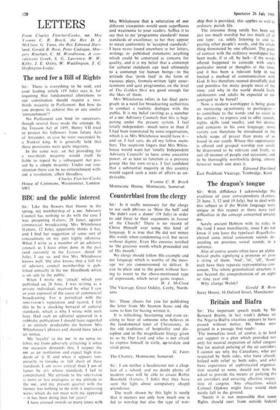Counterblast from the clergy
Sir: Is it really necessary for the clergy to use such phrases as 'How the hell' and `He didn't care a damn' (19 July) in order to add force to their arguments in favour of the Church? There is no record of Christ Himself ever using this kind of language. It is true that He did not mince His words when condemning evil, but never without dignity. Even His enemies testified to 'the gracious words which proceeded out of His mouth.'
We clergy should follow His example and use language which is worthy of the mess- age we are commissioned to deliver. It can be plain and to the point without hav- ing to resort to the above-mentioned type of expression, which never gains respect. D. J. McClure The Vicarage, Great Oakley, Corby, North- ants Sir: Three cheers for you for publishing the letter from Mr Stanton Jeans and the same to him for having written it.
It is refreshing, heartening and even ex- citing to hear of someone who believes in the fundamental tenet of Christianity, in the old traditions of hospitality and dis- cipline and in the magnificent liturgy given to us by Our Lord and who is not afraid to express himself in virile, up-to-date and vivid prose.
G. Yates The Chantry, Montacute, Somerset Sir: I am neither a headmaster nor a chap- lain of a school. and no doubt plenty of modern ones will be able to assure Robin Boustield (Letters, 5 July) that they have seen the light about compulsory chapel attendance.
The truth shown by this light is surely that it matters not only how much one is led to worship but also the type of wor-
ship that is provided; this applies as well to ordinary parish life.
The tiresome thing surely has been not just too much worship but too much all of one type: i.e. solely listening to and re- peating other people's words, and the whole thing dominated by one officiant. The point of contact with the ordinary worshipper ha, been made, if at all, by luck—if the word, offered happened to coincide with one's particular mood or thoughts at the time; and it has been a relevant help in too limited a method of communication with God. It has therefore seemed dreadfully dull and pointless for many people most of the time; and why in the world should lively adolescents and adults be expected or en- couraged to be bored?
Now a modern worshipper is being given an increasing opportunity to participate-- to contribute to the words and to assist in the actions: to express and to offer sound, sights, skills (and smells), and his desire, and concerns in his own language; more variety can therefore be introduced in the whole scope of prayer than many of us found in our youth. Where this opportunity is offered and grasped worship can surely be discovered to be relevant and lively, to suit all manner of people and occasions, and to be thoroughly worthwhile doing, almost however much one does it.
Edmund Haviland East Peckham Vicarage, Tonbridge, Kent


































 Previous page
Previous page